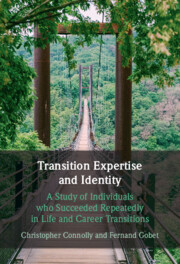 Transition Expertise and Identity
Transition Expertise and Identity Book contents
- Transition Expertise and Identity
- Transition Expertise and Identity
- Copyright page
- Dedication
- Contents
- Figures
- Tables
- Preface
- Acknowledgments
- Chapter 1 Introduction
- Part I Transitions
- Part II Transition Expertise
- Chapter 5 Cognitive Flexibility
- Chapter 6 Generative Intelligence
- Chapter 7 Personal Intelligences
- Chapter 8 Contextual Intelligence
- Part III Motivation
- Part IV The Project of the Self
- Appendix 1 Methodology
- Appendix 2 Nontransitions
- References
- Index
Chapter 5 - Cognitive Flexibility
Mental Adaptation and Evolution
from Part II - Transition Expertise
Published online by Cambridge University Press: 30 May 2024
- Transition Expertise and Identity
- Transition Expertise and Identity
- Copyright page
- Dedication
- Contents
- Figures
- Tables
- Preface
- Acknowledgments
- Chapter 1 Introduction
- Part I Transitions
- Part II Transition Expertise
- Chapter 5 Cognitive Flexibility
- Chapter 6 Generative Intelligence
- Chapter 7 Personal Intelligences
- Chapter 8 Contextual Intelligence
- Part III Motivation
- Part IV The Project of the Self
- Appendix 1 Methodology
- Appendix 2 Nontransitions
- References
- Index
Summary
This chapter addresses how cognitive flexibility enables an individual to respond adaptively to new situations and respond appropriately to any situation. Interrupting automaticity avoids being trapped in mindsets that foreclose generating new options; avoiding reductive bias reduces the tendency to oversimplify and turn dynamic processes into fixed objects and make complex interactions linear; avoiding functional fixedness reduces the tendency to apply the same solution to different situations; and cognitive connectivity opens up to new approaches in which mental models can be transformed, schemata reorganized, and cognitive bridges built between previous expertise and new situations. This kind of cognitive flexibility enables individuals to respond and adapt to the new situation into which they are moving. This is discussed in light of the retrospective interviews with twenty-four elite performers in three domains (business, sports, and music) who successfully and repeatedly transitioned to higher positions within their field.
Keywords
- Type
- Chapter
- Information
- Transition Expertise and IdentityA Study of Individuals Who Succeeded Repeatedly in Life and Career Transitions, pp. 61 - 91Publisher: Cambridge University PressPrint publication year: 2024


